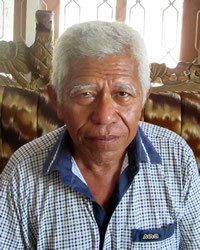Kumberaha in Indonesia

Photo Source:
Anonymous
|
Send Joshua Project a map of this people group.
|
| People Name: | Kumberaha |
| Country: | Indonesia |
| 10/40 Window: | Yes |
| Population: | 4,500 |
| World Population: | 4,500 |
| Primary Language: | Kumbewaha |
| Primary Religion: | Islam |
| Christian Adherents: | 0.00 % |
| Evangelicals: | 0.00 % |
| Scripture: | Translation Started |
| Ministry Resources: | No |
| Jesus Film: | No |
| Audio Recordings: | Yes |
| People Cluster: | New Guinea |
| Affinity Bloc: | Pacific Islanders |
| Progress Level: |
|
Introduction / History
Kumbe means "come," and waha means "year." One hundred percent (100%) of the adults speak Kumbewaha while only 40% of the children do. Before 1942 the Kumbewaha lived in the village called Wapomaru. Fighting against the Japanese during World War II resulted in many deaths. The dead bodies in the village were making many people sick so they moved to their present location. In 1955 a rebel leader burned the Kumbewaha village to the ground. The people escaped and lived in the jungle for seven years. In 1962 they came back and rebuilt the village. In 1962 the present village leader's father became village leader. The Kumbewaha live on the coastal road to the northeast between Pasarwajo and Lasalimu on Buton Island. They live in the Sulawesi Tenggara Province.
What Are Their Lives Like?
About 80% of the people are farmers and about 20% are fishermen. Others work in the mines. The Kumbewaha grow cloves, cocoa beans, coconuts, cassava, peppers, and red rice (very popular for health purposes). They have only one police department for their many villages, but there is very little crime. They have 20 men who walk around the village every night for security purposes.
What Are Their Beliefs?
The Kumbewaha are 100% Muslim. There are 3 mosques. About 40% of the people own their own Koran. The people are pretty good at practicing the 5 pillars of the faith (praying 5 times/day, fasting during Ramadan, etc.). They are friendly and appear not to be opposed to others sharing their faith with them. They are a very strong community that supports each other.
What Are Their Needs?
Education is their primary need. They need a high school. They also need teachers who are education majors, not just college graduates without the right background. They need a harbor and large nets to efficiently catch fish. The government provides them with small boats they don't need but doesn't provide them with nets they do need. They also need training to improve their farming skills. They need a hospital and a doctor.
Prayer Points
Pray for God to raise up and send workers. Pray for a high school staffed by well trained teachers. Pray for a worker to open a library in the village. Pray for a Disciple Making Movement to flourish among them.